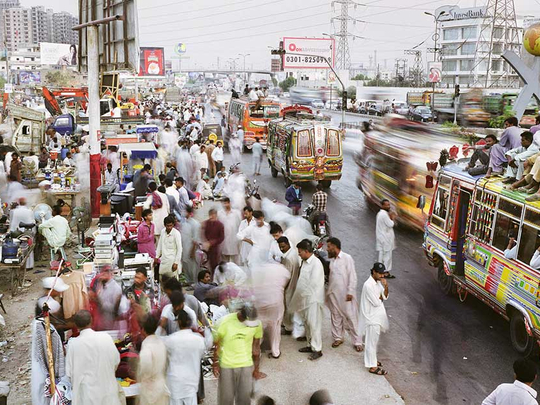
The approval on Friday by Pakistan’s army chief General Qamar Javed Bajwa to provide up to 200,000 army troops this year for carrying out Pakistan’s long overdue population census, may be a timely intervention to finally support an exercise that should have taken place years ago. And yet, the decision clearly reflects the risk of overlooking the many gaps surrounding Pakistan, which have been exposed with the delay in conducting this exercise.
The final outcome of the census will shed light not only on the total population of Pakistan and the pace of growth, but also the divisions among the country’s four major provinces.
For years, Pakistan’s smaller provinces have demanded more rights on the grounds of witnessing a larger population growth by comparison to the country’s bigger provinces. And yet, such demands in the past have been driven by speculation rather than tangible realities.
Clearly, there are two equally important dimensions to the lessons thrown up from the delay. On the one hand, issues such as a fair division of resources between the federal government at the centre and Pakistan’s provinces, need to be put at rest. Without a resolution to such matters, squabbling over who gets what will never end. Already, Pakistan suffers from polarised relations between the country’s centre and the populous Punjab province on one side and the three other provinces — Sindh, Balochistan and Khyber Pakhtunkhwa (KP). The division has sharpened over time, mainly because the idea of resources not being transferred to the three provinces outside Punjab has gained momentum. And in the process, the one crucial area in need of close attention has been largely ignored.
Physical infrastructure
The issue of Pakistan’s out-of-control population growth has present itself as a major risk to matters like available economic resources and assets like physical infrastructure and available land. Its obvious that a key part of Pakistan’s national security is here at stake.
The other dimension is also too serious to be ignored. Years of failure by successive ruling structures to revamp parts of the government has indeed fuelled what is known as Pakistan’s continuing crisis of governance. More than eight years after General Pervez Musharraf stepped down as the last military ruler and paved the way for a return to civilian rule, Pakistan’s quality of governance has only deteriorated. The past week threw up one of the worst instances of squabbling politicians when two groups of rival lawmakers came to blows on the floor of the parliament in Islamabad.
The episode highlighted the degree to which parliament has become more of a talk shop. Moreover, the record of Pakistan’s federal and provincial legislatures in pushing forward issues of public interest remains dismal at best.
And the past year has also witnessed a frequent exchange of charges and counter-charges over issues of corruption after Prime Minister Nawaz Sharif’s three children were found to own massive offshore wealth, in the global expose that came to be known as the “Panama leaks”. The case is presently being heard by Pakistan’s Supreme Court.
The decision to draw in the army for the census indeed also reflects huge gaps in Pakistan’s structure of government and governance. In a clear departure from the days when the civilian ruling structure was relatively more capable of assuming responsibility, today’s realities are starkly different. Not only has the government’s ability to enforce its writ in key areas become compromised over time, but tragically, members of Pakistan’s ruling structure have neither shown the interest nor the capacity to focus on issues that would give a long overdue qualitative uplift to the lives of the country’s poor.
It is therefore not surprising that with this abdication of responsibility, the private sector has stepped in to provide key services, though at an exorbitant cost. Across some of Pakistan’s poorest of the poor neighbourhoods, privately run schools and clinics have taken over as services provided by the state have practically wound up.
With this background, it is hard not to be sceptical about reports of Pakistan’s southern Sindh province banning manual labour by children of up to 14 years of age. Though the measure is indeed commendable, it has, nevertheless, left behind a troubling question: Who will enforce the law?
The poor and vulnerable
Across Karachi, the capital of Sindh, there is an abundance of evidence of the law being available, but only to the rich and mighty and those with clout. There may well be a few high-profile enforcements to prove that the law is working in favour of the poor and vulnerable, but a society-wide change will come in Pakistan only when there is a complete revamp of the system that will put the public’s interests on top of the list of priorities.
And the failure to change the priorities is evident nowhere more than Sharif’s own preferences as scores of Pakistanis struggle to make ends meet. Just recently, he inaugurated yet another urban transport project in the city of Multan. Known as the Metro Bus Service, the project emulates earlier ventures in Lahore — Sharif’s home town — and Islamabad, the capital. Though the idea of air-conditioned buses plying on elevated platforms has caught Sharif’s fancy, it ought to be lower down the list of Pakistan’s priorities.
In stark contrast to the need for providing comfortable bus services, a crash in Pakistan’s agricultural sector in the past two years and a considerable slowdown in the industrial sector are too critical areas that cannot be ignored. But a fundamental change of priorities will be too much to expect from a ruling structure that has practically ignored other pressing matters, such as creating a lasting framework to carry out population census in times to come.
Farhan Bokhari is a Pakistan-based commentator who writes on political and economic matters.








